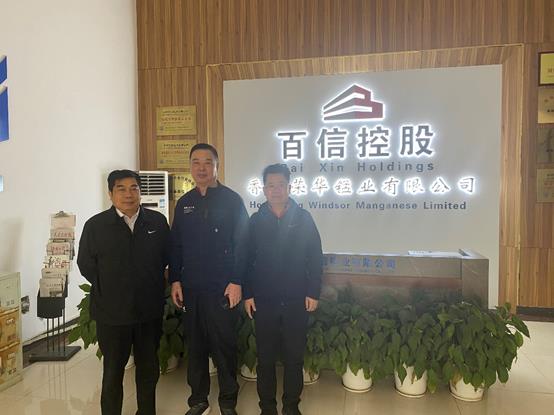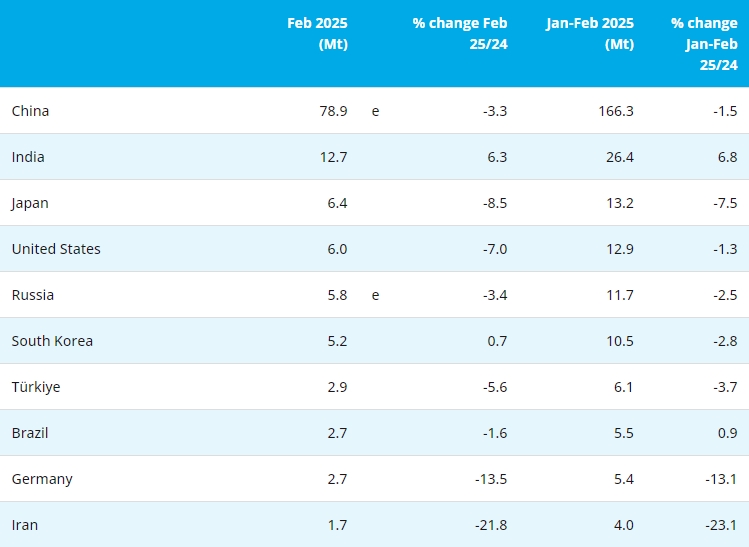[Ferro-Alloys.com] Shanxi to be national hydrogen industry hub
Province developing complete supply chain for clean gas
The North China province of Shanxi is expected to become a national hub for the hydrogen industry, according to local officials and industry insiders.
The development of hydrogen as a new source of energy is part of Shanxi's energy revolution strategy.
A traditional base for coal mining, Shanxi has recently implemented an economic transformation move to reduce its reliance on coal and increase the ratio of new and renewable energy resources.
Local statistics show the generation capacity of electricity from new and renewable resources makes up more than 30 percent of Shanxi's power industry. These include a capacity of 20.47 million kilowatts in the wind power industry and a capacity of 13.37 million kW in the solar power industry.
The Shanxi government's choice of hydrogen as a breakthrough point for energy revolution stems from several reasons. Among others, the province has rich resources for cost-effective hydrogen production, a full industrial chain from upstream manufacturing to downstream utilization, and a strong demand from the market.
The northern Shanxi city of Datong is one of the pioneers in the province developing a full chain for the hydrogen industry.
According to Liu Hongwen, deputy chief of the Datong bureau of industry and information technology, Datong is the first city in Shanxi to put a fleet of hydrogen-fuel-cell buses into operation. The fleet of 100 buses is supported by a number of hydrogen production plants and filling stations.
In Datong, hydrogen is mostly produced with the technique of water electrolysis.
"Water is the cleanest resource for making hydrogen but the production process requires a huge amount of electricity," Liu said. "The strong demand for electricity can be addressed with the large capacity of solar and wind power plants in Datong."
The wind and solar power sectors are affected by the weather and their unstable supply to power grids is a disadvantage when it comes to long-distance transmission. "However, such a problem can be solved when the electricity is used by local water electrolysis plants," Liu explained.
The official added that huge market demand can ensure the steady growth of the hydrogen industry.
In Datong, there are about 45,000 trucks used in the transportation of coal and ores.
"Most of those trucks travel on regular routes from mines to railway stations," Liu said. "It is feasible to turn those into HFC vehicles as the hydrogen filling stations can be easily accessible along the regular routes."
Datong became one of the first cities in China to release its development plan for the hydrogen industry in September 2020. According to the plan, businesses in hydrogen production and supply as well as hydrogen-consuming vehicle owners can enjoy subsidies from the government.
Replacing conventional trucks with hydrogen-fueled ones can be made possible thanks to the rapid development of the manufacturing industry of hydrogen fuel cells and HFC trucks in Shanxi.
Meijin Energy Group based in Qingxu county in Taiyuan is one of such manufacturers.
According to Yao Jincheng, vice-president of the company, Meijin's ambition is to grow into the largest base for heavy-duty HFC truck production in China.
The company has just debuted its first batch of HFC trucks. The 100 trucks are currently used in the transportation of supplies and finished products in Meijin's industrial park in Qingxu.
Yao said the biggest advantage of HFC trucks is the environmental benefit.
"An HFC truck can normally travel more than 100,000 kilometers a year and there is no carbon dioxide emissions at all," Yao said. "That is a sharp contrast to conventional diesel trucks that can discharge 120 metric tons of carbon dioxide during that period of time."
However, Yao is still concerned about the cost of using hydrogen as fuel.
Meijin is also a producer of hydrogen using coking gas as a raw material.
Coking gas-converted hydrogen is relatively cheaper than water-electrolyzed hydrogen, according to Yao.
Meijin is an operator of several coal mines and coking plants, which ensure its supply of coking gas for hydrogen production, Yao added.
"The hydrogen consumption of a 49-ton HFC truck is about 10 kilograms per 100 km, which can translate into a cost of about 350 yuan ($55) based on the current hydrogen price," Yao said. "This is about 50 yuan higher than the cost of a diesel-fueled truck."
Considering there are subsidies for HFC vehicles and hydrogen prices are expected to be further lowered with production scale expansion, HFC trucks can be more attractive to vehicle owners in the future, Yao said.
While coking gas-converted hydrogen shows a relative cost advantage over water-electrolyzed hydrogen, experts said reducing CO2 emissions in the production process is a pressing challenge needing to be addressed.
Shi Yulin, an expert in hydrogen research in Shanxi, said recycling CO2 in the coking process for the production of chemicals and other industrial materials can be a solution to the problem.
"For instance, recycled CO2 can be used as refrigerant and an energy storage agent," Shi said. "Emissions reduction is always the result of efficient use of resources."
The hydrogen industry is showing a huge potential for growth throughout the world.
According to a report released by international organization the Hydrogen Council, the hydrogen industry will reach a market scale of $2.5 trillion by 2050. Hydrogen has the potential to lead to a reduction of 6 billion tons of CO2 emissions and create more than 30 million jobs by that time.
Source:China Daily
- [Editor:tianyawei]



 Save
Save Print
Print Daily News
Daily News Research
Research Magazine
Magazine Company Database
Company Database Customized Database
Customized Database Conferences
Conferences Advertisement
Advertisement Trade
Trade














 Online inquiry
Online inquiry Contact
Contact

Tell Us What You Think